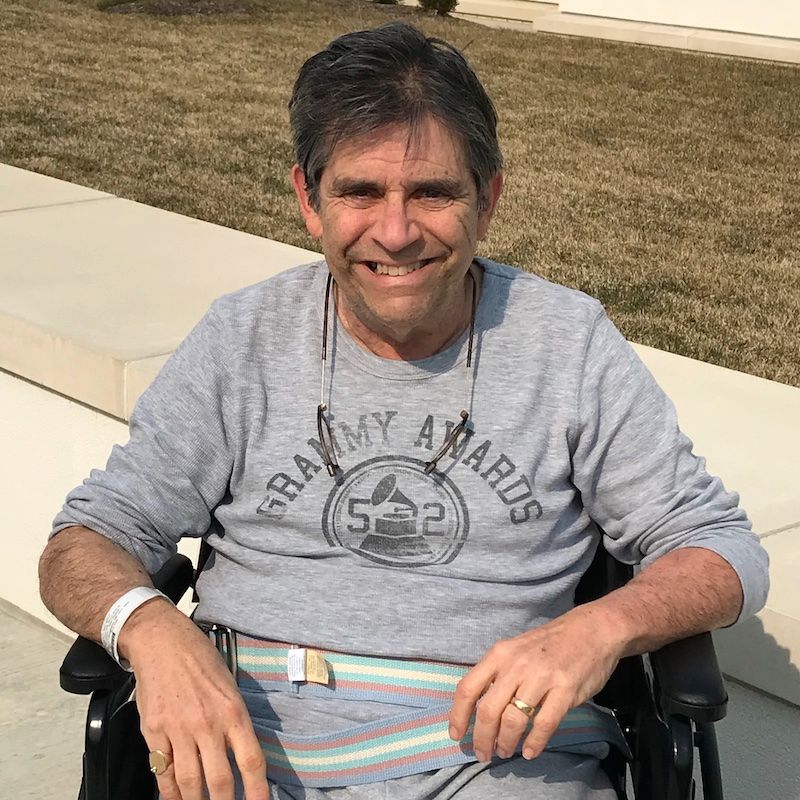“Your husband has dementia,” said the social worker. “What arrangements would you like us to make?” The voice in my head screamed “No! That can’t be right. I want a do-over.”
I’m not a doctor, but I do know Jack better than anyone. He could barely lift his feet, he was incontinent, his thinking was confused. He’s a type 2 diabetic with coronary artery disease and takes a gazillion pills every day. There could have been any number of explanations for his debilitating illness, but I knew dementia wasn’t one of them. I was determined to find an answer.
Countless trips to the emergency room, blood tests, x-rays, scans, weeks in hospitals and rehab facilities, and numerous attempts at physical therapy left us clueless and frustrated.
That “do-over” came several years after my husband’s symptoms began. A perceptive speech therapist working on Jack’s cognitive deficit referred us to another neurologist. The doctor examined him, asked me questions about changes in Jack, and listened. Then he ran a completely different series of tests including a CT scan, lumbar puncture, continuous lumbar CSF drainage, intracranial pressure monitoring, and isotope cisternography. At last, we had a diagnosis: normal pressure hydrocephalus. And with it came hope.

What is normal pressure hydrocephalus (NPH)?
NPH is a potentially reversible cause of dementia that can be improved with treatment. It is a chronic, neurological condition caused by an abnormal buildup of cerebrospinal fluid in the brain’s ventricles. The build-up results in the distinctive symptom triad three w’s — incontinence (“wet”), gait instability (“wobbly”), and cognitive changes (“wacky”).
According to the Hydrocephalus Association more than 700,000 Americans over the age of 60 suffer from NPH, but less than 20% are properly diagnosed and treated. NPH is frequently overlooked and dismissed because its symptoms are generally associated with the aging process and illnesses like Alzheimer’s and Parkinson’s disease. Many individuals think it’s normal and assume they must learn to live with the problems.
“Doctors need to look at the whole person, not just one symptom,” says Dr. A.R. Craciun, a neurologist at Cleveland Clinic. If a patient shows signs of dementia, it pays to look a little deeper and see what else might be going on.
Knowing the signs of normal pressure hydrocephalus can help caregivers pursue a proper diagnosis and normalize this rare disease.
Members of a support group on Facebook, both the affected and caregiver, shared their experiences with NPH. Kathy related that, over time, she had difficulty walking and chalked it up to aging. Then the incontinence started. All the while, she was having trouble thinking straight. Her sister practically dragged her to the doctor. “The doctor listened as my sister explained all the things she was seeing: walking, wetting, and unclear thinking.” The doctor ordered numerous tests. Kathy was diagnosed with NPH and subsequently scheduled for surgery to place a shunt.
The most common treatment for NPH is the surgical implantation of a shunt. A flexible tube placed in the ventricular system of the brain diverts the flow of cerebrospinal fluid (CSF) to another area of the body, where it can be absorbed. A valve within the shunt maintains CSF at normal levels.
Dr. Craciun emphasizes that a caregiver or family member who advocates for their loved one is key to the diagnosis. They can detect long- and short-term changes that might not be apparent during an office visit. It’s important to have someone who really knows the patient accompany them to doctor appointments, share their observations, and learn more about testing and treating the condition.
Linda can vouch for that. “Before my diagnosis I was a poor historian about how many times I’d fallen and other problems. My daughter spoke for me when I wasn’t giving a whole story.”
Knowledge about NPH is helpful. Ann’s dad was diagnosed with NPH after two years of falling and suffering with memory loss. She said, “It was a difficult couple of years trying to get someone to diagnose him correctly. I think because I’m a nurse, someone finally listened. I can’t imagine what people without a strong advocate have to deal with.”
Mary said her husband Allen exhibited symptoms for almost seven years. He was first given vitamin B12 shots for pernicious anemia. As he deteriorated, Allen was diagnosed with dementia. Mary was in tears, convinced something else was going on. A neuropsychologist asked why she was in denial. “You’re going to have to accept that he’s not going to get better.” Sixteen emergency room visits in eighteen months later, a young neurologist diagnosed NPH. Then a neurosurgeon observed Allen’s attempt to walk. He agreed, “He has NPH. We can fix it with a shunt.” After the shunt surgery, the neuropsychologist called to set up another exam. Happy with the results Mary said, “No. He had NPH, not dementia, and he’s doing well.”
Lynde said, “We were lucky. Mom declined rapidly after knee surgery.” During several trips to the ER, she was treated for “failure to thrive” until a doctor suggested it was NPH. “I took that and ran with it,” she said. “We saw two different neurosurgeons who weren’t entirely convinced. But after a lumbar puncture where cerebral fluid was drained, we saw such an improvement. She was scheduled for shunt surgery two weeks later. The neurosurgeon commented that so many people don’t know about NPH.”
Members of the support network collectively ask, “why don’t more people know about NPH?” We see commercials on TV explaining symptoms and treatment for diseases like psoriasis, heart failure, insomnia, and even the “bent carrot.” Stars and athletes are opening up about their mental health. It’s time for NPH to be normalized and emerge from the shadows so those suffering can get the proper treatment.
While finding answers is a relief, it’s also exasperating because getting the diagnosis feels like an endless struggle. No one should suffer assuming it’s just their age. That’s why I’m speaking up along with members of the NPH support group. Encourage the medical community to look deeper than the obvious signs. You can be informed and proactive. The Hydrocephalus Association offers education, support, and patient advocacy.
MORE NORMAL PRESSURE HYDROCEPHALUS READS
She was headed to a locked psych ward. Then an ER doctor made a startling discovery. (Washington Post, paywalled content)
